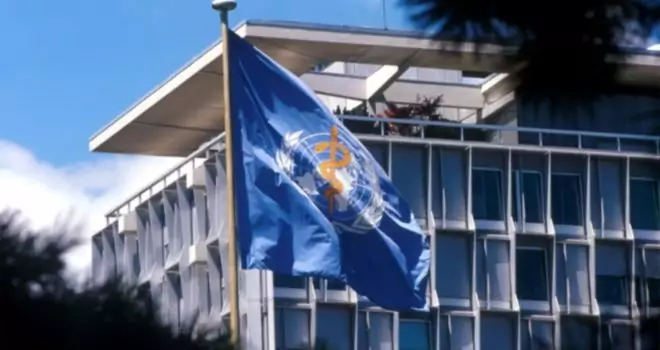WHF is the only CVD organization in official relations with the WHO. Advocating directly to the WHO for improved CVD prevention and control.
Strategically located in Geneva, the seat of the World Health Organization (WHO), WHF advocates at the highest levels to bring CVD to the forefront of the global health agenda. We work with representatives of Member States and key decision-makers at the WHO in a number of ways:
- Attending and advocating at global and regional meetings organized by WHO
- Aligning our workplan and objectives with the WHO goal of achieving a 25% reduction in premature mortality from NCDs by the year 2025 and UN SDG 3.4 on reducing by one third premature mortality from non-communicable diseases through prevention and treatment and promote mental health and well-being by 2030.
- Working with key teams within the WHO to develop and implement health tools and policy
- Supporting the WHO Global Coordinating Mechanism
- Responding to consultations on CVD-related health topics
- Engaging with and supporting Member States as they work to achieve UHC
WHF Advocacy at WHO Meetings
The World Heart Federation Advocacy Team represents the policy interests of our Members at major regional and global health conferences to advocate for improved CVD prevention and control.
The Executive Board (EB) meetings of the WHO are held twice annually, in January/February and May/June. During these meetings, Member States debate pressing global health issues and propose draft resolutions to tackle these problems, which are then submitted for consideration and adoption at the World Health Assembly.
The World Health Assembly (WHA) is the main decision-making and governance body of the WHO, where Member States debate and decide on key global health issues. Taking place in Geneva once a year, its agenda is largely determined by the WHO Executive Board meetings.
The WHO Regional Committee Meetings offer additional key advocacy opportunities. Held annually from August to October, these meetings address pressing health issues specific to each of the six WHO Regions.
At each of these meetings, the WHF Advocacy Team takes the opportunity to make statements on Agenda Items relevant to CVD and NCDs, as well as related topics, such as access to essential medicines and the health of refugees and migrants.
The WHO Executive Board, World Health Assembly and WHO Regional Committee Meetings also gather important health actors and decision-makers together, presenting valuable opportunities to advocate for improved CVD prevention and control at a targeted scale.
WHO Global Action Plan on NCDs
Providing a roadmap and policy options to achieve the global 25 by 25 targets
To accelerate the UN’s commitments to address NCDs in 2011, the World Health Organization created a Global Action Plan for the Prevention and Control of NCDs, which covers the years 2013-2020. This document was written in collaboration with the World Heart Federation and other health stakeholders and provides countries with a plan of action and menu of policy options to reduce their burden of CVD.
The Global Action Plan (GAP) recognizes that governments have a primary role and responsibility to play in responding to the challenge of NCDs, but require the support of international organizations and other experts. It is structured around a WHO goal of achieving a 25% reduction in premature mortality from NCDs by the year 2025. From this broad NCD goal, the World Heart Federation set its own ambitious global goal of reducing premature death from CVD by 25% by 2025.
WHO Global Monitoring Framework
Providing a framework to track progress towards the global 25 by 25 targets
To support the Global Action Plan, the WHO created the NCD Global Monitoring Framework (GMF) to track progress in preventing and controlling the four major NCDs. The GMF tracks progress on NCDs against the nine voluntary global targets highlighted in the GAP, so is a key tool to hold countries accountable to their UN commitments. The framework is also intended to provide the foundation for advocacy, raising awareness, reinforcing political commitment and promoting global action.
WHO Global Coordinating Mechanism
Created in 2014, the WHO Global Coordination Mechanism on NCDs (GCM) was established to support the implementation of the Global Action Plan (GAP) and Global Monitoring Framework (GMF) by coordinating activities, engagement and cross-sector action. Led by Member States, other participants include United Nations organizations, non-governmental organizations and academic institutions.
The World Heart Federation has participated actively in the GAP, GMF and GCM since their inception, both independently and through the NCD Alliance.
Partnering with the WHO
WHF is the only CVD organization in official relations with the WHO. This special status not only allows us to make statements representing the interests of our Members at meetings of the governing bodies, but also necessitates a formal shared workplan and close working relationship with the Department for Universal Health Coverage/Communicable and Noncommunicable Diseases.
WHF currently supports the WHO in its promotion of the HEARTS technical package, development of capacity-building materials related to air pollution and CVD, and implementation of the 2018 WHA Resolution on RHD, among other areas of work.
Latest News
Advancing ambitious ncd and cardiovascular agendas at who Executive Board 158
The World Heart Federation (WHF) actively represented the global cardiovascular community at the 158th session of the World Health Organization (WHO) Executive Board, which was held from 02 to 07 February 2026 in Geneva, Switzerland. The WHF delegation, headed by Dr. Bente Mikkelsen, Chair of its Advocacy Committee, delivered a series of statements across multiple […]
Economics of Health for All
Primary Health Care
Well-Being and Health Promotion
Positioning Health as a Foundation for Social and Economic Development
This constituency statement was led and delivered by NCD Alliance, with contributions from the World Heart Federation, under agenda item 26 – Economics of Health for All – at the 158th session of the WHO Executive Board. Distinguished delegates, We welcome WHO’s strategy on the Economics of Health for All. The strategy rightly positions […]
Noncommunicable Diseases
Advancing Well-Being through Action on the Determinants of NCDs
This constituency statement was led and delivered by the World Heart Federation under agenda item 23 – Well-Being and Health Promotion – at the 158th session of the WHO Executive Board. This statement is delivered by the World Heart Federation on behalf of… World Stroke Organization (WSO) International Society on Thrombosis and Haemostasis (ISTH) International […]
Noncommunicable Diseases
Leaving No One Behind: Integrating NCDs into Health Emergencies and Humanitarian Settings
This constituency statement was led and delivered by the World Heart Federation under agenda item 16 – WHO’s Work in Health Emergencies – at the 158th session of the WHO Executive Board. This statement is delivered by the World Heart Federation on behalf of… World Stroke Organization (WSO) Global Alliance for Tobacco Control (GATC) International Society […]
Noncommunicable Diseases



